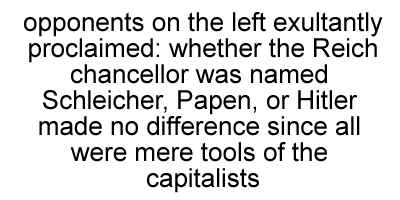Notes on German Big Business
and the Rise of Hitler by Henry Ashby Turner
page 5
by William P. Meyers
Also sponsored by Earth Pendant at PeacefulJewelry
Popular pages:
| U.S. War Against Asia |
| Fascism |
| Barack Obama |
| Democratic Party |
| Republican Party |
| Natural Liberation |
Catholic Center Party Alliance with Nazis; Rise of von Papen

In 1931 "despite denials from both sides, rumors persistently circulated throughout the fall to the effect that the Catholic Center Party was negotiating with the Nazis with the aim of forming coalition governments dominated by these two parties, both at the state and national levels." [191]
But the Roman Catholic and Center Party leader Bruning resigned as chancellor in May 1932, "having lost the confidence of President Hindenburg." Hindenburg had hoped Bruning would move the cabinet further to the right, then "The breach between the two widened when the cabinet imposed a ban on Nazi storm troopers but not on leftist para-military organizations." [226]
"The appointment of the obscure [Franz von] Papen as chancellor came as just as much a surprise to even the best informed leaders of big business as it did to the rest of Germany." [228] Papen had a political career "as a right-wind Center Party deputy to the Prussian state parliament . . . [and was] chairman of the supervisory board of the Catholic newspaper Germania." . . . "Papen certainly seemed determined to win the support of the Nazis." [229]
"Nazis as Champions of Parliament and the Workers"
"During the late summer and autumn of 1932 the NSDAP followed a course that alienated virtually all of big business." Elected Nazis "suddenly transformed themselves into advocates of parliamentary democracy and champions of the laboring masses." [272] "The Reichstag election of July 31, 1932, further eroded the initially precarious parliamentary position of the Papen cabinet by virtually obliterating the non-Catholic parties of the middle." [272]
Papen hoped to work with a coalition of the Nazis and Catholic Center Party, but both parties rejected his overtures. Papen wanted to rule by decree, as dictator. "In mid-August Papen turned to the Nazis and offered Hitler the nominal post of vice-chancellor." Hitler rejected the offer, insisting that Hindenburg appoint him Chancellor. [273]
"In early September the [Nazi] party's Reichstag deputies, who were conferring with Centrist deputies about a possible coalition, joined with their Catholic negotiating partners in condemning the cabinet's new measures as unfair to Germany's workers." [277] Negative sentiment among businessmen towards the Nazis grew.
"In Dusseldorf the Deutsche Bergwerks-Zeitung observed in the midst of the election campaign that if a reader did not immediately recognize a Nazi newspaper from its masthead, he would often have difficulty deciding whether what he read had been written by a Communist, a Social Democrat, or a Nazi." [280]
"As Hitler began his final drive for power, relations between the NSDAP and the business community seemed to have reached an all-time low." Vorwarts, the Social Democratic daily, wrote in January 1933: "Hitlerism has long since lost all credit with high finance, heavy industry, and large landowners." [312]
"While Hitler moved towards his goal of the chancellorship with a sure sense for the realities of power, his opponents on the left exultantly proclaimed an ultimately despairing and incapacitating message, which they insisted the meeting of January 4 had verified: Whether the Reich chancellor was named Schleicher, Papen, or Hitler made no difference since all were mere tools of the capitalists." [317]
Next: Hitler's Reality page 6
